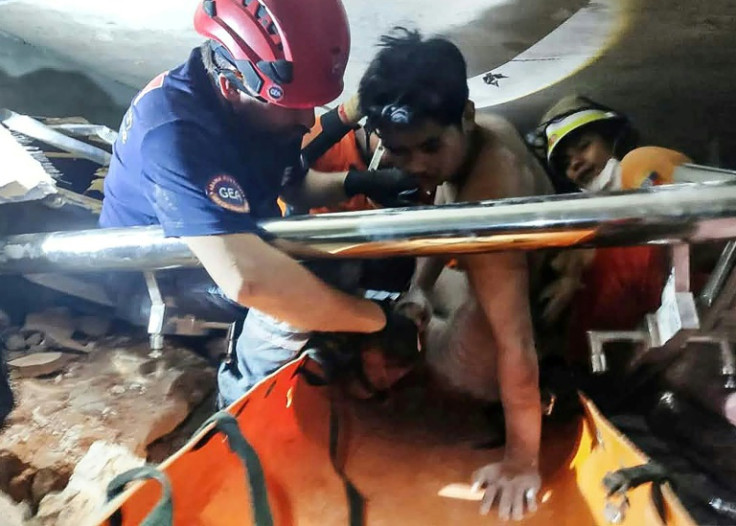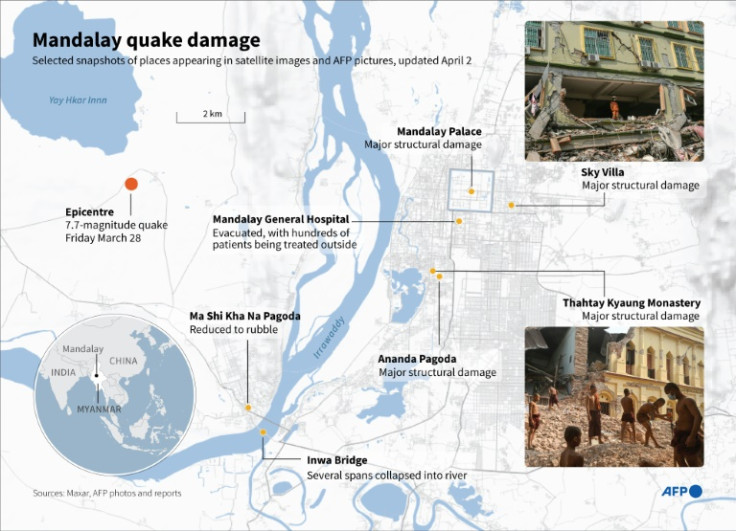Myanmar Quake Victim Rescued After 5 Days As Aid Calls Grow

Rescuers on Wednesday pulled a man alive from the rubble five days after Myanmar's devastating earthquake, as calls grew for the junta to allow more aid in and halt attacks on rebels.
The shallow 7.7-magnitude earthquake on Friday flattened buildings across Myanmar, killing more than 2,700 people and making thousands more homeless.
Several leading armed groups fighting the government have suspended hostilities during the quake recovery, but junta chief Min Aung Hlaing said military operations would continue -- despite international criticism of multiple reported air strikes.
UN agencies, rights groups and foreign governments have urged all sides in Myanmar's civil war to stop fighting and focus on helping those affected by the quake, the biggest to hit the country in decades.
Hopes of finding more survivors are fading, but there was a moment of joy on Wednesday as a man was pulled alive from the ruins of a hotel in the capital Naypyidaw.
The 26-year-old hotel worker was extracted by a joint Myanmar-Turkish team shortly after midnight, the fire service and junta said.
Dazed and dusty but conscious, the man was pulled through a hole in the rubble and put on a stretcher, video posted on Facebook by the Myanmar Fire Services Department showed.
Min Aung Hlaing said Tuesday that the death toll had risen to 2,719, with more than 4,500 injured and 441 still missing.
But with patchy communication and infrastructure delaying efforts to gather information and deliver aid, the full scale of the disaster has yet to become clear, and the toll is likely to rise.
The World Health Organization (WHO) reported severe damage in the city of Sagaing, citing local rescuers saying one in three houses there have collapsed.
Healthcare facilities, damaged by the quake and with limited capacity, are "overwhelmed by a large number of patients", while supplies of food, water and medicine are running low, WHO said in an update.
Sagaing has seen some of the heaviest fighting in Myanmar's civil war, and AFP journalists have not been able to reach the area.
Relief groups say the overall quake response has been hindered by continued fighting between the junta and the complex patchwork of armed groups opposed to its rule, which began in a 2021 coup.
Julie Bishop, the UN special envoy on Myanmar, called on all sides to "focus their efforts on the protection of civilians, including aid workers, and the delivery of life-saving assistance".
Even before Friday's earthquake, 3.5 million people were displaced by the fighting, many of them at risk of hunger, according to the United Nations.
Late Tuesday, an alliance of three of Myanmar's most powerful ethnic minority armed groups announced a one-month pause in hostilities to support humanitarian efforts in response to the quake.
The announcement by the Three Brotherhood Alliance followed a separate partial ceasefire called by the People's Defence Force -- civilian groups that took up arms after the coup to fight junta rule.
But there have been multiple reports of junta air strikes against rebel groups since the quake.
"We are aware that some ethnic armed groups are currently not engaged in combat, but are organising and training to carry out attacks," said Min Aung Hlaing, mentioning sabotage against the electricity supply.
"Since such activities constitute attacks, the Tatmadaw (armed forces) will continue to carry out necessary defensive activities," he said in a statement late Tuesday.
But the UN special rapporteur on human rights in Myanmar, Tom Andrews, rejected the junta's characterisation of its operations.
"Senior General Min Aung Hlaing has described ongoing junta attacks in the midst of Myanmar's suffering as 'necessary protective measures'," he wrote on X.
"They are neither necessary nor protective. They are outrageous and should be condemned in the strongest possible terms by world leaders."
Australia's government decried the reported air strikes saying they "exacerbated the suffering of the people".
"We condemn these acts and call on the military regime to immediately cease military operations and allow full humanitarian access to affected areas," Foreign Minister Penny Wong said.
Amnesty International said "inhumane" military attacks were significantly complicating earthquake relief efforts in Myanmar.
"You cannot ask for aid with one hand and bomb with the other," said the group's Myanmar researcher Joe Freeman.
Hundreds of kilometres away, in the Thai capital Bangkok, workers continued to scour through the rubble of a collapsed 30-storey skyscraper.
The structure had been under construction when the earthquake hit and its crash buried dozens of builders -- few of whom have come out alive.

© Copyright AFP 2025. All rights reserved.





















